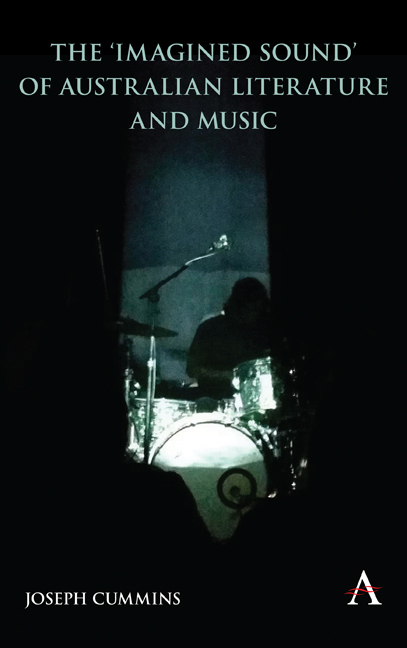Book contents
- Frontmatter
- Contents
- Foreword
- Acknowledgements
- Introduction: Imagined Sound
- Part One Listening to the Continent
- 1 Reimagining ‘The Centre’: Francis Webb's ‘Eyre All Alone’ and David Lumsdaine's Aria for Edward John Eyre
- 2 Midnight Oil: Sounding Australian Rock Around the Bicentenary
- 3 Sound and Silence: Listening and Relation in the Novels of Alex Miller
- Part Two Listening to Islands and Archipelagos
- Part Three Listening to the Continental Archipelago
- Coda
- Notes
- Works Cited
- Index
3 - Sound and Silence: Listening and Relation in the Novels of Alex Miller
from Part One - Listening to the Continent
Published online by Cambridge University Press: 18 September 2019
- Frontmatter
- Contents
- Foreword
- Acknowledgements
- Introduction: Imagined Sound
- Part One Listening to the Continent
- 1 Reimagining ‘The Centre’: Francis Webb's ‘Eyre All Alone’ and David Lumsdaine's Aria for Edward John Eyre
- 2 Midnight Oil: Sounding Australian Rock Around the Bicentenary
- 3 Sound and Silence: Listening and Relation in the Novels of Alex Miller
- Part Two Listening to Islands and Archipelagos
- Part Three Listening to the Continental Archipelago
- Coda
- Notes
- Works Cited
- Index
Summary
To listen to the novelistic soundscapes of Australian writer Alex Miller is to encounter a refined postcolonial sounding of the Australian interior, one that creates complex links with other continental spaces while also making the defining move into the post-Mabo epoch. Such journeys are not into the geographic centre but to another influential geoimaginary, the bush. Over the course of his oeuvre, Miller's ‘search’ opens out an alternative space to the sandy desert-centred representations produced by Webb, Lumsdaine and Midnight Oil. The novelist's continental interior is a personally oriented (although not necessarily completely unique) geoimaginary with foundations in his first encounter with rural landscapes after emigrating to Australia from England and his subsequent work as a stockman on various cattle stations in Central Queensland and the Northern Territory (Miller in Dixon, 2012).
The soundscapes I examine in two of Miller's Central Queensland novels – Journey to the Stone Country (2002) and Landscape of Farewell (2007) – focus on the journey of an explorer-like figure, what Elizabeth McMahon, evoking Georg Lukacs's theory of ‘transcendental homelessness’, calls ‘the wanderer’. McMahon argues this wanderer is ‘only ever truly located when they enter into the centre of another, which [in Miller] is figured as being within a continental diversity’ (2012, 125). Entering into the centre of another, for McMahon, is embedded within an ‘anthropomorphic overlay’ (127) between identity and geography, particularly the figure of the island. This intersection operates in multiple registers, in terms of sharing stories, traveling into country and forming friendships.
In Miller's novels, moving into the centre is as much about a journey into a physical, historical and mnemonic landscape as it is about the need to listen sympathetically to the cultural other. The two Central Queensland novels, published in the midst of the political and cultural turmoil of ‘The History Wars’, as well as work from earlier and later in his career, such as The Tivington Nott (1989), The Sitters (1995) and Autumn Laing (2011), foreground the confrontation between the self and the other. This nexus of concerns with postcolonial identity aligns with and speaks to the post-Mabo era of spatial politics, a period that Ali Gumillya Baker and Gus Worby argue created a ‘moral dilemma […] in public consciousness’ that ‘has had profound and contradictory impacts on what it means to be Australian, Aboriginal, Indigenous, non-Indigenous, and sovereign’ (2007, 31).
- Type
- Chapter
- Information
- The 'Imagined Sound' of Australian Literature and Music , pp. 65 - 82Publisher: Anthem PressPrint publication year: 2019



